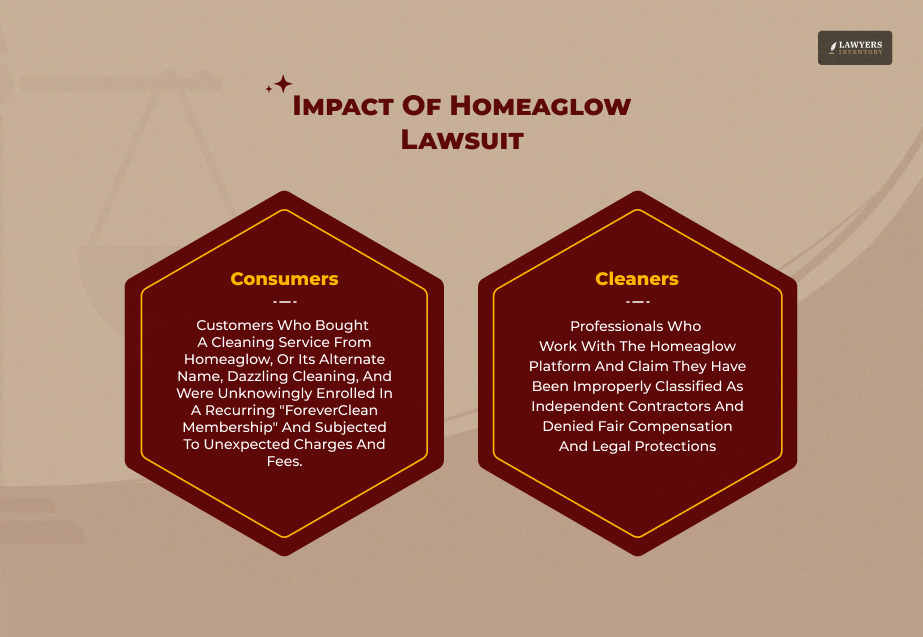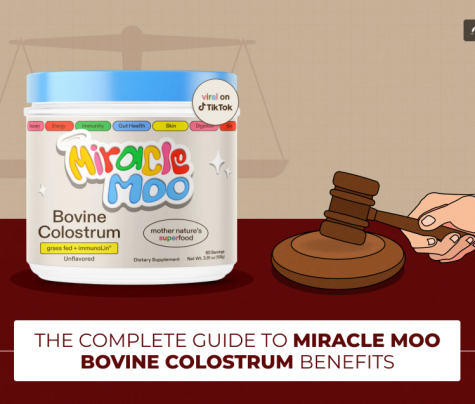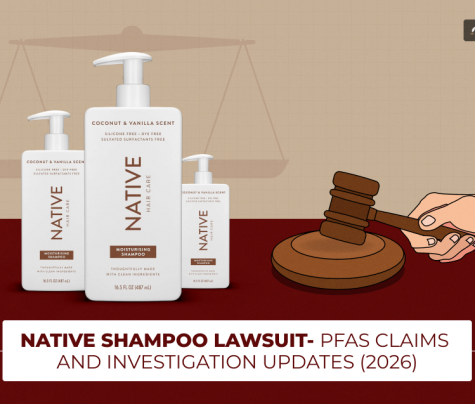
Homeaglow (also operating under names like Dazzling Cleaning) is an online platform that connects customers with local cleaners through discounted “promotional” bookings and membership-style pricing.
It grew quickly by promising low-cost cleanings, easy booking, and flexible cleaner supply. But in recent years, Homeaglow has faced a wave of legal trouble and consumer complaints, thrusting the company into broader debates about gig-economy accountability.
From alleged worker misclassification and unpaid wages to deceptive billing and even telemarketing claims, the company and its clients have faced numerous issues to contend with. “According to the lawsuit, Homeaglow allegedly engaged in unfair competition in violation of California Labor Code Sections §§ 204, 210, 221, 226.7, 226.8, 510, 512, 1194, 1197, 1197.1, 1198 & 2802,” reports PRWeb.
In this article, I will talk about the following things:
- How does Homeaglow work?
- What is the Homeaglow Lawsuit?
- The major allegations in the lawsuit.
- How did the company respond?
- The impact of the Homeaglow Lawsuit.
- What should customers keep in mind?
Therefore, if these are some of the things that you need to keep in mind, then keep on reading this blog till the end…
How Does Homeaglow Work?
Having a clear understanding of how exactly Homeaglow works is very important for you to know about the lawsuit. This is because, as PRWeb rightly mentions, many of the lawsuits hinge on whether Homeaglow’s contractors are truly independent — or in fact employees entitled to minimum wage, expense reimbursement, and other protections.
Here’s a simple breakdown of how this cleaning service functions:
- Customers select a cleaning level, book online, and pay through the platform. The company often markets an introductory rate (e.g., “$19 initial cleaning”) and a monthly membership for discounted recurring service.
- Cleaners sign up on the platform, accept bookings, and are listed as independent contractors in Homeaglow’s terms. The platform handles job flow, payments, and (allegedly) some vetting.
- Revenue model is built on margins between customer payments and cleaner payouts, membership fees, and sometimes add-on charges.
However, as per the lawsuit that the plaintiffs Seth Seneca and Lisa Andoh have filed, they claim that “Dazzling Cleaning misleads consumers by failing to disclose that a $19 cleaning offer is conditioned on a $49 per month membership.”
What Is The Homeaglow Lawsuit?

According to Consumer Shield, multiple employees have taken legal action, alleging that Homeaglow’s payment system violates their rights under the California Labor Code. The suits seek not only payment for the work done that has not been paid for but also repayment of the money spent on cleaning supplies.
What Are The Types Of Claims In The Lawsuit?
Multiple legal claims and regulatory complaints against Homeaglow fall into three broad categories:
- Worker misclassification & wage claims: Cleaners have filed lawsuits alleging they were treated as employees in practice — subject to scheduling constraints, performance rules, and fee deductions — while being denied wages, expense reimbursements, and benefits. Prominent class-action filings and law-firm press releases date back several years.
- Consumer protection / deceptive billing: Dozens (and in some sources, thousands) of consumer complaints allege undisclosed membership charges, difficulty canceling recurring fees, and misleading advertising about low promotional rates. Review platforms and the Better Business Bureau show a pattern of similar grievances.
- Telemarketing / TCPA claims: Class actions have also been brought alleging Homeaglow made unsolicited automated calls (robocalls) to consumers without proper consent — a separate line of litigation under the Telephone Consumer Protection Act (TCPA).
What Are The Major Allegations In The Homeaglow Lawsuit?
Top Class Actions reports that the plaintiffs, represented by Craig M. Nicholas, Shaun Markley, and Jordan Belcastro of Nicholas & Tomasevic, LLP, are “suing for violations of California’s Unfair Competition Law, False Advertising Law, and Consumer Legal Remedies Act, as well as breach of contract, conversion, unjust enrichment, negligent misrepresentation, and imposition of an illegal penalty.”
Here is a table that clearly states and explains all the allegations in the lawsuit and what the plaintiffs must do in order to prove these:
| Claim | What Plaintiffs Allege | Legal theory / what must be shown |
| Misclassification | Cleaners “required” to follow rules, accept set bookings, pay platform fees; thus they are employees | Control test (degree of control over work), economic realities test; state labor law |
| Wage & expense claims | Not reimbursed for supplies/transport; earnings fall below minimum wage after fees | Violations of wage/hour laws and reimbursement statutes |
| Deceptive billing | Introductory rates hide auto-renewing memberships or cancellation fees | Consumer protection laws (unfair/deceptive practices) |
| TCPA / robocalls | Automated calls placed without prior express consent | TCPA liability for unsolicited pre-recorded calls |
How Did Homeaglow Respond To The Lawsuit Allegations?
Truth In Advertising mentions how Homeaglow responded to these allegations. In their statement, the company had stated:
“Homeaglow strongly disputes the allegations set forth in TINA’s correspondence, and denies that its marketing practices violated the FTC Act, the Restore Online Shoppers’ Confidence Act, or any other law.”
Additionally, they also emphasized how they are committed to “transparency and are always working to improve [their] product.”
Homeaglow’s public posture has varied by filing and time period. In earlier responses to lawsuits, the company’s defense lawyers have argued that cleaners are independent contractors, citing contractual language and the ability to accept or reject jobs.
For consumer claims, Homeaglow has sometimes disputed the factual allegations, arguing that fees and memberships were disclosed in the checkout flow and terms. Where class claims have progressed, Homeaglow has moved to dismiss or to compel arbitration in certain cases.
What Is The Impact Of The Homeaglow Lawsuit?

Consumer review sites and forums reveal polarized experiences. For instance, many users praise individual cleaners and occasionally report good service. At the same time, a substantial number of complaints cite billing problems, poor customer service, and trouble canceling memberships — as reflected in BBB entries and online threads.
Additionally, social media posts from cleaners and customers have amplified scrutiny and driven press coverage. Here’s how the lawsuit has impacted people from all sectors:
Read Also: What Is The Vintage Broncos Ford Lawsuit About?
How Does The Homeaglow Lawsuit Affect Customers?
- Watch for membership fees: Several complaints allege recurring charges after booking a promotional cleaning; consumers should monitor bank statements and dispute unauthorized charges.
- Document everything: Save confirmation emails, screenshots of advertised prices, and cancellation requests. These records are key if you pursue chargebacks or participate in a consumer class.
- Remedies: Finally, if a settlement occurs for deceptive billing, consumer class members may receive refunds; for TCPA claims, statutory damages are possible.
How Does The Homeaglow Lawsuit Affect Cleaners / Workers?
- Potential upside: If misclassification claims succeed (or settlements are reached), cleaners could receive back wages, expense reimbursements, and/or changes in how the platform operates.
- Practical steps for workers: Keep logs of hours, bookings rejected/accepted, communications with platform support, and any platform rules that direct how work must be done. Additionally, these help establish the degree of control during litigation.
- Risks: Litigation can take years, and platforms sometimes change policies, rely on arbitration clauses, or cut ties with outspoken workers.
Read Also: Why Is HexClad Facing A Lawsuit?
What Are The Potential Outcomes Of The Homeaglow Lawsuit?
The Homeaglow litigation is a multi-front legal battle about how modern platforms treat the people who deliver services and the consumers who rely on them. Here are some of the most likely outcomes of the case:
- Settlement vs. trial: Many gig-economy disputes settle before trial; settlement terms may include payments to workers, changes to contract language, and clearer billing disclosures.
- Appellate implications: Published appellate rulings that resolve misclassification tests or TCPA liability for specific call flows could shape future platform practices (see recent Ninth Circuit memorandum in Seneca v. Homeaglow).
- Regulatory interest: State consumer protection agencies and attorneys general may also pursue enforcement actions depending on patterns of complaints.
Whether the cases result in large settlements, contractual reforms, or published appellate rulings, they are another indication that the gig economy will continue to be shaped by :
- Litigation.
- Regulation.
- Consumer activism.
And these will have real consequences for workers and users alike.




![Roblox Class Action Lawsuit: Who Can Help You & What To Do? [Complete Legal Guide]](https://lawyersinventory.com/wp-content/uploads/2026/02/roblox-class-action-lawsuit-100x100.png)






0 Reply
No comments yet.